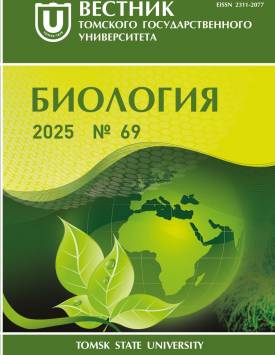The role of the TGF-β1/PI3K/Akt mediated signaling pathway in the progression of estrogen-positive breast cancer
The study of factors contributing to the adjuvant hormone therapy resistance in estrogen-positive breast cancer (BC) is an important aspect of scientific research. Tamoxifen resistance can be determined by the regulation of the estrogen receptor signaling pathway via membrane tyrosine kinases. Among the various membrane kinases, the activation of the transforming growth factor β1 (TGF-β1) and the triggering of alternative PI3K/Akt signaling can be critical in the hormonal resistance. The aim of the study was to analyze the protein expression of TGF-β1, TGF-βR1, TGF-βR2, pAkt1, cyclin D1 as well as the cell populations of TGF-β1/TGF-βR2, TGF-βR1/TGF-βR2, pAkt!/TGF-βR2 and cyclin D1/TGF-βR2 in tumor tissue depending on the response to tamoxifen treatment. This study included 65 BC patients (T1-4N0-3M0) who received breast-conserving surgery or radical mastectomy, radiation and/or chemotherapy (if indications) and adjuvant hormonal therapy with tamoxifen (5 years, 20 mg/day). Patients without any recurrence or metastasis the adjuvant tamoxifen therapy were classified as a tamoxifen-sensitive subgroup ((TS), N = 55 (84.6%)); patients with distant metastasis or recurrence were classified as resistant to tamoxifen ((TR), N = 10 (15.4%)). Proteins expression as well as cell population expression was assessed using a CytoFLEX flow cytometer (Beckman Coulter, USA). Progression-free survival (PFS) was estimated according to the Kaplan-Meier method, and survival differences between groups were determined using the log-rank test. P-value of less than 0.05 was considered statistically significant. Tumors with high of TGF-βR1 and TGF-PR2 protein expression were more prevalent among TS patients (p = 0.036 and p = 0.006; respectively. See Fig, 1). Increased risk of breast cancer progression was associated with a high pAkt1 expression in tumor cells (p = 0.024, See Fig, 1). Patients with the high pAkt1+/TGF-βR2+ and cyclin D1+/TGFβR2- expression in tumor tissue were less sensitive to tamoxifen treatment (p = 0.006 and р = 0.000; respectively). However, a high percentage of pAkt!-/TGF-βR2+ and cyclin D1+/TGFβR2+ cells was detected in the tumor tissue of patients with the response to treatment (p = 0.001 and p = 0.003, respectively). High TGF-βR2 and pAkt!-/TGF-βR2+ expression was associated with longer progression-free survival (log-rank p = 0.006 and log-rank p = 0.008). Moreover, we demonstrated a significant relationship of both high pAkt1 and pAkt1+/TGF-βR2+, pAkt!+/TGF-βR2- expression with poor survival of breast cancer patients (log-rank p = 0.002 and log-rank p = 0.001, respectively). Our data indicate the possible use of the identified parameters as markers associated with the efficacy of adjuvant tamoxifen therapy. The article contains 1 Figure, 10 References. The Authors declare no conflict of interest.
Keywords
estrogen-positive breast cancer, transforming growth factor β-1 (TGF-β1), PI3K/Akt - signaling, tamoxifen, resistance, flow cytometryAuthors
| Name | Organization | |
| Dronova Tatyana A. | Cancer Research Institute, Tomsk National Research Medical Center | tanyadronova@mail.ru |
| Babyshkina Nataliya N. | Cancer Research Institute, Tomsk National Research Medical Center; Siberian State Medical University | nbabyshkina@mail.ru |
| Vtorushin Sergey V. | Cancer Research Institute, Tomsk National Research Medical Center | wtorushin@rambler.ru |
| Cherdyntseva Nadezhda V. | Cancer Research Institute, Tomsk National Research Medical Center | nvch@tnimc.ru |
References

The role of the TGF-β1/PI3K/Akt mediated signaling pathway in the progression of estrogen-positive breast cancer | Vestnik Tomskogo gosudarstvennogo universiteta. Biologiya - Tomsk State University Journal of Biology. 2025. № 69. DOI: 10.17223/19988591/69/9
